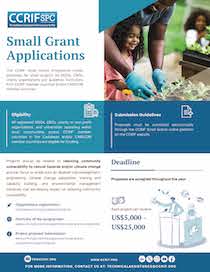Grand Cayman, Cayman Islands, August 28, 2011 – The Caribbean Catastrophe Risk Insurance Facility (CCRIF) has announced that, while Hurricane Irene resulted in registered losses in six of its member countries (Anguilla, Antigua & Barbuda, the Bahamas, Haiti, St. Kitts & Nevis and the Turks & Caicos Islands), none of the policies of these countries were triggered. Of these territories, the highest losses were determined for the Bahamas and the Turks & Caicos Islands. None of the other four countries was impacted by more than lower Tropical Storm-force winds (under 50mph).
The CCRIF Board and Team share the relief of the Governments of the Turks & Caicos Islands and the Bahamas that the impacts of Hurricane Irene were not as bad as had been feared. Early damage reports indicate low to moderate impacts except for some southern and eastern islands in the Bahamas, which lay directly on Irene’s path. Critical tourism infrastructure, on which these countries largely depend for economic activity, was not badly affected. The Bahamas Ministry of Tourism indicated that the major tourism areas of Nassau/Paradise Island and Grand Bahama have seen a quick return to normal operations. According to Dr Simon Young, CEO of Caribbean Risk Managers, the Facility Supervisor of CCRIF, “based on reports from affected governments, we don’t see a major immediate loss of revenue to any of the countries impacted by Irene, which is what the CCRIF policy is designed to cover. However, we do recognise that significant damage has been done in some of the smaller islands in the Bahamas, and CCRIF has already contacted the government to see what other ways it may be able to assist, for example through CCRIF’s technical assistance programme.”
Within 24 hours of the passage of the hurricane, preliminary calculations of the modelled losses in all CCRIF countries were completed. Dr Simon Young says that, “While the Bahamas endured the largest modelled loss, the absence of major impacts in Nassau and Freeport, where most of the economic exposure covered by the CCRIF policy is situated, meant that the loss was below the trigger level.”
On Friday morning, CCRIF contacted both governments to advise them that their policies were not triggered. Turks and Caicos’ Financial Secretary confirmed that the damage was not as significant as was expected and indicated that the damage was primarily associated with flooding. CCRIF’s current hurricane policy is specifically geared to wind and storm surge losses; impacts from rain and inland flooding are not included either in the premium calculation or the modelled loss.
Since CCRIF’s inception in 2007, the Facility has made eight payouts totalling just under US$33 million to seven member governments. Most recently, following the passage of Hurricane Tomas in 2010, policies for three CCRIF member countries were triggered resulting in payouts to Barbados which received US$8,560,247, Saint Lucia - US$3,241,613 and St. Vincent & the Grenadines - US$1,090,388.
About CCRIF: CCRIF is a not-for profit risk pooling facility, owned, operated and registered in the Caribbean for Caribbean governments. It is designed to limit the financial impact of catastrophic hurricanes and earthquakes to Caribbean governments by quickly providing short term liquidity when a policy is triggered. It is the world’s first and, to date, only regional fund utilising parametric insurance, giving Caribbean governments the unique opportunity to purchase earthquake and hurricane catastrophe coverage with lowest-possible pricing. CCRIF represents a paradigm shift in the way governments treat risk, with Caribbean governments leading the way in pre-disaster planning.
CCRIF was developed through funding from the Japanese Government, and was capitalised through contributions to a multi-donor Trust Fund by the Government of Canada, the European Union, the World Bank, the governments of the UK and France, the Caribbean Development Bank and the governments of Ireland and Bermuda, as well as through membership fees paid by participating governments.
Sixteen governments are members of the fund: Anguilla, Antigua & Barbuda, Bahamas, Barbados, Belize, Bermuda, Cayman Islands, Dominica, Grenada, Haiti, Jamaica, St. Kitts & Nevis, Saint Lucia, St. Vincent & the Grenadines, Trinidad & Tobago and the Turks & Caicos Islands.
For more information, contact Simon Young at syoung@caribrm.com, CCRIF at pr@ccrif.org or visit the website at www.ccrif.org.
English





